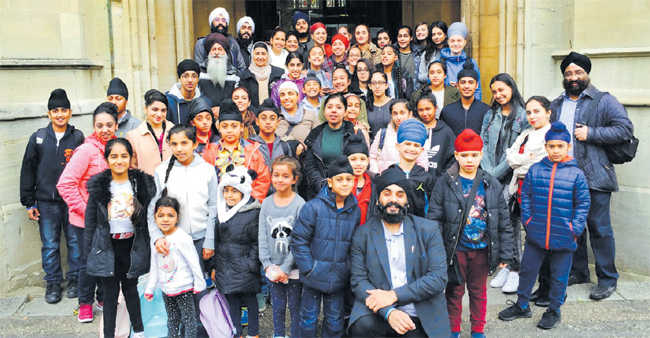He's a historian with a difference. Rather than burying himself all day in weighty tomes and highbrow research papers, Rav Singh loves to share his vast knowledge with children and adults alike. Donning the mantle of a tour guide, he is conducting walks around London, familiarising motley groups with the richness of Anglo-Sikh history.
“I presented a paper, ‘Sikh History on the Streets of London’, at the Sikh Studies Conference, Imperial College, London, in August 2014,” says Rav. “It was there that I met Sikh scholars Dr Kamalroop Singh and Gurinder Singh Mann. They provided support and encouragement to formalise my research into the Walking Tours. They also gave me the confidence to launch my website, ‘A little history of the Sikhs’.”
Does his bunch of walkers include only Sikhs? “I welcome anyone with an interest in Sikh and Anglo-Sikh history (from the 1820s to the present day). The groups have included Sikh and non-Sikh Londoners, other UK nationals, and recently, visitors from Canada, the US and India,” he says.
Rav has developed a selection of tours around London, maintaining a database of over 100 locations. Following advertisements via Facebook and partner organisations, a WhatsApp group provides a series of instructions to confirm arrangements for the day. Each walk is designed to be about three hours long, with ample stops to listen to stories and view artefacts.
This year, he has focused on two tours: One, a walk through the London Borough of Kensington, starting at Sloane Square, visiting the Chillianwala Memorial at the Royal Hospital, Chelsea, on to the Punjab Frontier Force Memorial Chapel at St Lukes Church and finishing at the Victoria and Albert Museum, with a viewing of the Multan throne of Maharaja Ranjit Singh; and two, a trip through the streets of Westminster, starting at Hyde Park Corner at the Commonwealth Memorial Gates, narrating the stories of the Sikhs who were awarded the Victoria Cross, onto Buckingham Palace for hearing tales of the 1857 Mutiny, and ending at No. 1 Whitehall Place for a viewing of a painting of Duleep Singh at the National Liberal Club.
Other walks include the Duleep Singh Tour, ‘In the footsteps of Udham Singh’ Tour and a Sikh Treasures’ Tour. The tour charges are £7 to £11 per adult (free for children). Donations on behalf of the walking group are then made to the places visited, and any surpluses are donated to a range of Sikh educational charities.
Earlier this year, Rav also conducted a group visit to Belgium and France to learn about the history of the Sikh regiments in World War I. From February to June 2017, there will be a series of tours on the Anglo-Sikh Wars, to be organised in conjunction with Gurinder Singh Mann’s Sikh Museum Initiative project on the epic battles fought in the 1840s.
The UK-born Rav has a strong connect with North India, a region he frequently visits. His father hails from Rurka Kalan village in Jalandhar district, while his mother is from Kullu (Himachal Pradesh). His parents arrived in Britain in the early 1970s. His wife, Avinash Kaur, is from Panchkula (Haryana).
A management consultant specialising in public sector regeneration initiatives, he established his own consultancy in 2013. He is currently executing the Civic Centre Project in London’s Whitechapel, which allows him “the flexibility to devote time to his interest in history.” With winter arriving, he will spend the next few months on research – before putting on his walking shoes again for more trips down the Anglo-Sikh lane.
London Monopoly Board
The Anglo-Sikh History Monopoly Board was conceptualised at a camp for Sikh children aged 7 to 17 at Karamsar Gurdwara, Ilford, in April 2011. While giving a PowerPoint presentation at the camp, Rav Singh engaged the children through locations in London they had heard of or visited – the Tower of London, Oxford Street, Trafalgar Square, Leicester Square etc. It was then that he started a project to map the locations on the British Monopoly Board to aspects of Anglo-Sikh and Sikh history. He presented his creation to children during a Karamsar Gurdwara camp in April 2012, and later at the Connect2Sikhi winter camp at Barking Gurdwara in December 2012.
Unlock Exclusive Insights with The Tribune Premium
Take your experience further with Premium access.
Thought-provoking Opinions, Expert Analysis, In-depth Insights and other Member Only Benefits
Already a Member? Sign In Now










